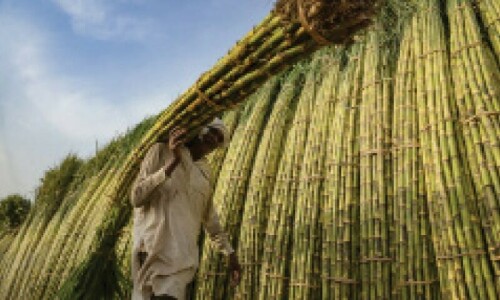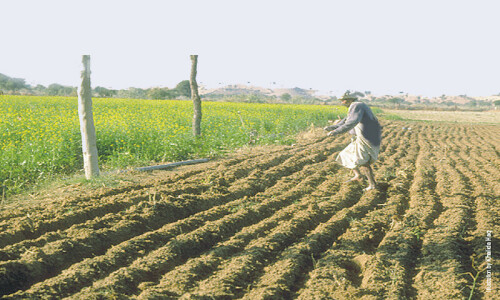Regenerative agriculture (RA) — a current buzzword in Pakistan’s agricultural communities — is part of a global movement towards sustainable agriculture. This approach, comprising a set of principles and practices, primarily revolves around soil health, crop diversification, water stewardship and biodiversity.
In Pakistan, excessive tillage practices have led to soil degradation and loss of biodiversity. Recurrent planting of the same crops on the same piece of land year after year has depleted specific soil nutrients so farmers must apply more chemical fertilisers to get a better yield.
Additionally, repetitive cropping patterns provide a continuous food source and habitat for pests and pathogens, leading to an increased reliance on pesticides, which not only drives up production costs but also poses a serious threat to biodiversity and ecosystems.
Contrary to the decades-old slogan of the Punjab Agriculture Department — “dub kay waa tay raj kay kha” (plough intensively to get higher yields) — RA emphasises minimising soil disturbance through no-till or low-till practices.
It also promotes maintaining soil cover with mulch or cover crops, increasing organic fertilisation, disrupting weed cycles and encouraging crop diversity and crop rotations.
These practices may enhance soil water retention and improve nutrient availability, lowering irrigation, fertiliser and pesticide requirements
Proponents of RA argue that these practices enhance soil water retention and improve nutrient availability. By preserving the underground biological structures created by fungi, bacteria, and other soil microbes, significant above-ground benefits are achieved in return.
This results in lower irrigation, fertiliser, and pesticide requirements.
Additionally, these eco-friendly practices restore biodiversity, improve ecosystem health, and remove more carbon from the atmosphere, thereby reducing global warming.
RA is particularly effective for perennial crops that have longer life cycles. Perennial grasses, like Rhodes grass and alfalfa, remain productive for longer periods. Similarly, sugarcane — the fifth largest crop in Pakistan — is generally ratooned for 2-3 years without disturbing the soil, reducing costs and energy usage.
Beyond doubt, RA holds immense potential to transform our approach to farming. However, effectively integrating RA into Pakistan’s current cropping system, which is dominated by five major crops — wheat, rice, maize, cotton, and sugarcane — poses a significant challenge.
Additional barriers such as farmers’ lack of awareness, insufficient resources, limited access to technology and a general risk-averse approach further complicate the adoption of RA practices in a holistic way.
Therefore, it is essential for the government and development agencies to prioritise and customise high-impact practices, particularly those that have already made inroads in Pakistan’s agricultural landscape, for widespread implementation. Some of them are highlighted below.
Pakistan’s present agricultural production system is highly input-intensive, aiming to maximise yields to meet the food demands of its growing population using unsustainable agriculture practices that are unable to withstand climate change and degrade biodiversity.
Three decades ago, zero-tillage drills were introduced in Pakistan for sowing wheat directly into paddy and cotton stubble without the need for ploughing. Although their adoption has grown in recent years, there remains a need to increase the availability of these drills among wheat farmers, particularly in regions where these technologies have not yet been fully explored.
Likewise, the direct seeding of rice (DSR) technique, introduced in Pakistan a few years ago, reduces soil disturbance and offers significant water savings. Despite the availability of DSR drills in the rice belt, adoption has been limited, primarily due to higher weed infestations.
Relay cropping — planting a new crop before the previous crop is fully harvested — is another effective way to minimise tillage and enhance soil health.
In accordance with RA principles, farmers should be encouraged to conduct soil analysis, apply organic fertilisers like farmyard manure and crop residue — ideally processed through a fermenter — and cultivate crops specifically for green manure to enrich the soil and boost organic matter contents.
With Pakistan facing severe water scarcity, effective water stewardship is imperative. This includes improving water-use efficiency and minimising farm-level water conveyance losses. Specifically to conserve water for rice cultivation, raised-bed planting and alternate wetting-and-drying irrigation techniques need to be promoted on a large scale.
To limit pest infestation and reduce reliance on pesticides, RA promotes natural pest control methods, including crop rotation, planting border crops, improving cultural practices, increasing the population of beneficial insects (predators), using bio-pesticides, and utilising tools like pheromones, yellow sticky traps, and pink bollworm ropes.
Pakistan’s present agricultural production system is highly input-intensive, aiming to maximise yields to meet the food demands of its growing population. Yet the current agriculture practices are unsustainable, unable to withstand climate change and above all, degrading biodiversity.
On the other hand, transitioning to regenerative agriculture may initially result in reduced crop yields. This presents a significant challenge for Pakistan: balancing the need for resilient, sustainable agriculture with the imperative to increase food production.
Farmers are usually reluctant to change generations-old practices without any considerable financial gain. Consequently, adopting crop rotation and diversification can be challenging. Factors such as higher returns from current crops, easy access to their inputs, established markets and processing facilities, and the presence of crop-specific clusters often deter farmers from exploring alternatives.
However, the escalating costs of petroleum, electricity, fertilisers and pesticides could prompt the farmers, particularly smallholders, to shift towards RA. The sooner they adopt these eco-friendly practices, the better the outcomes will be. This transition requires dedicated and well-trained agricultural extension service providers to support farmers through the transition.
Khalid Wattoo is a farmer and a development professional, and Dr Waqar Ahmad is a former Associate Professor at the University of Agriculture, Faisalabad.
Published in Dawn, The Business and Finance Weekly, August 12th, 2024































